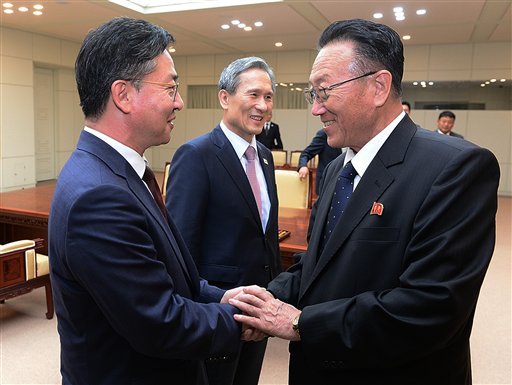South Korea, US say North military easing off war-footing

In this photo provided by the South Korean Unification Ministry, South Korean Unification Minister Hong Yong-pyo, left, shakes hands with Kim Yang Gon, right, a senior North Korean official responsible for South Korean affairs, as South Korean presidential security adviser Kim Kwan-jin looks on after their meeting at the border village of Panmunjom in Paju, South Korea, Tuesday, Aug. 25, 2015. THE SOUTH KOREAN UNIFICATION MINISTRY VIA AP
SEOUL, South Korea—The North Korean military is slowly easing its battle-readiness posture, South Korean and US officials said Wednesday after Seoul and Pyongyang secured a deal allowing them to step back from the brink of an armed clash.
Under the agreement reached after marathon, top-level negotiations in the border truce village of Panmunjom, the North undertook to shift down from a “semi war state” once the South ended propaganda broadcasts across the border at midday (0300 GMT) Tuesday.
The defense ministry in Seoul said it had noted a number of signs of de-escalation, including the “re-appearance” of a large part of the North’s submarine fleet that had been deployed off-radar over the weekend.
“As the North is easing its combat readiness, we’re readjusting our own defense posture,” said a ministry official who declined to be identified.
Both militaries had been on maximum alert for days, amid an escalating crisis that saw South Korean and US fighters flying dummy bombing runs and North Korean heavy artillery units being wheeled up to the border.
The ministry official said the North had been observed closing gunports on heavy weapons installations guarding the Koreas’ disputed Yellow Sea border.
Handguns, not rifles
And North Korean security guards in Panmunjom were back to carrying handguns, rather than the rifles they had shouldered since Friday, he added.
The latest inter-Korean crisis had its roots in landmine blasts earlier this month that maimed two South Korean soldiers on patrol along the border with the North.
Seoul blamed Pyongyang and responded by switching on banks of giant speakers, which had lain silent for more than a decade, and blasting propaganda messages into North Korea.
The North denied any involvement and threatened to attack the propaganda units as cross-border military tensions soared.
The agreement reached in Panmunjom saw the North express regret—but not admit responsibility—for the maiming of the two soldiers, while the South undertook to cease the high-decibel broadcasts.
The United States, which has close to 30,000 troops permanently stationed in ally South Korea, welcomed the decision to de-escalate after what it called a “very tense” few days.
In a regular briefing for reporters, Pentagon press secretary Peter Cook said US surveillance had also noted a relaxation in the North’s military stance.
‘Efforts to de-escalate’
“As this agreement’s moved forward, we have seen, at least on the part of the North Koreans, some efforts to de-escalate … both on land and at sea,” Cook said.
“It doesn’t mean we’re back to normal, but we feel better about this situation,” Cook added.
While both North and South have spun very different interpretations of the joint communique that came out of the Panmunjom meeting, they have also made positive noises about an additional undertaking to hold official talks either in Seoul of Pyongyang.
South Korea’s Unification Ministry, which overseas cross border relations, said a broad range of issues could be discussed at such talks—including Pyongyang’s demand for the lifting of sanctions imposed after the sinking of a South Korean naval vessel in 2010.
The South maintains the corvette was sunk by a North Korean torpedo and has demanded a full apology in return for lifting the sanctions which cut nearly all economic and commercial links with the North.
North Korea had repeatedly denied the charge and frequently cited the sanctions as a major obstacle to improved relations.
Unification Ministry spokesman Jeong Joon-Hee said the North might well consider bringing up the sanctions issue at the proposed talks.
“In which case, I think it can be dealt with through dialogue,” Jeong said.
RELATED STORIES
North, South Korea agree to defuse crisis after marathon talks
Koreas agree second round of conflict crisis talks














